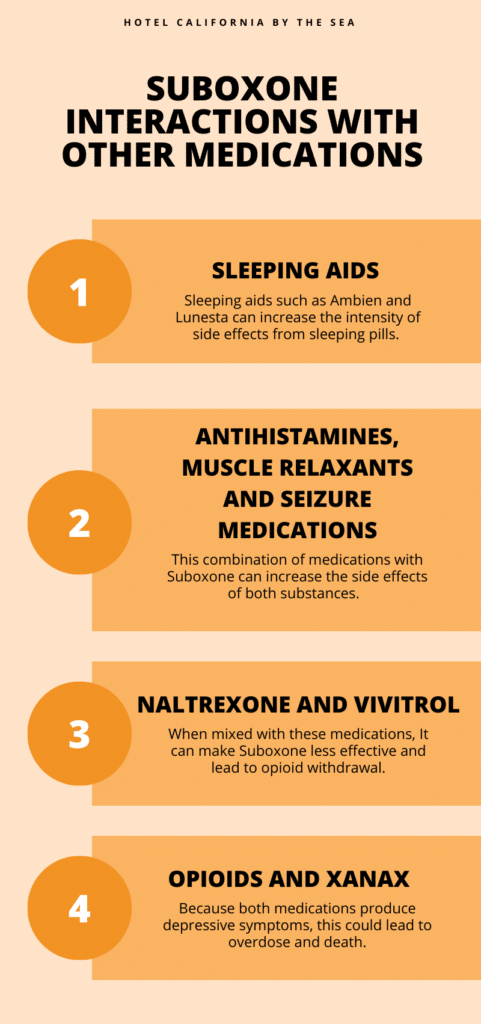What medications can you NOT take with Suboxone?
What medications can you not take with Suboxone? Can you take Xanax with Suboxone? Suboxone is a prescription drug commonly used as part of a comprehensive treatment plan to treat opioid use disorder. This type of medication treatment can be effective, but with long-term use, Suboxone can increase the risks of developing mental health side effects and other co-occurring conditions. Unfortunately, it can have some interactions with other substances and medications. When on Suboxone, it is generally recommended not to take any other drugs such as alcohol, opioids or benzos because it could either enhance or decrease the effects of either substance.
So how does Suboxone work to help those with opioid use disorder? Suboxone works by binding to the same receptors in the brain that opiates such as heroin and morphine attach to. By attaching to opioid receptors, it dulls the effects of intoxication. This prevents further drug cravings and helps reduce symptoms usually experienced during opioid withdrawal.

Suboxone contains a combination of the active ingredients buprenorphine and naloxone. Buprenorphine is an opioid partial agonist-antagonist, in which it partially attaches to opioid receptors and only lightly activates them. This helps decrease opioid cravings and decrease the severity of opioid withdrawal symptoms. Naltrexone is an opioid blocker that attaches to opioid receptors in the brain preventing any opioids from binding. It prevents opioids from producing the relaxing and euphoric effects it is known to have.
Some of the common Side Effects of Suboxone
- Nausea and vomiting
- Headache
- Increased sweating
- Difficulty sleeping and development of sleep disorders
- Muscle pain
- Hypotension
- Changes in liver function
- Changes in adrenal gland function

What medications can you not take with Suboxone?
Central nervous system depressants significantly slow down brain activity affecting both psychological and physical aspects. It is also known as a sedative. When mixed with Suboxone, it can cause a higher risk of respiratory depression, extreme drowsiness, loss of consciousness and even coma. When taking Suboxone, alcohol and other types of sedative medications should be avoided due to the possibility of adverse effects.
Another medication to avoid while on Suboxone is opioids. Prescription pain medications, also known as opioids have become more and more common. These days, medical providers are writing more prescriptions for opioid medications. A highly potent and habit-forming substance, developing an addiction to opioids can start off through a doctor’s prescription. Severe dependency and addiction to opioids is known as opioid use disorder.
Signs of Opioid Addiction include:
- Being unable to stop using opioids despite negative health and relationship consequences
- Needing to use more opioids in order to achieve the same effects
- Going through withdrawal symptoms when usage has stopped
- Spending the majority of time using, finding or recovering from opioids
- Giving up activities once enjoyed in order to use opioids
When on Suboxone, it is best to avoid taking opioids such as methadone, morphine and oxycodone because it can make some of these pain relievers less effective. It can also raise the risk of a serious condition called serotonin syndrome. Serotonin syndrome is caused by a build-up of chemicals called serotonin in the body and the body is unable to process it quickly enough.
Serotonin is a neurotransmitter located in areas such as the brain, spinal cord and intestine. It helps regulate different aspects of the body including mood, memory, sleep, digestion, blood flow and body temperature. Serotonin syndrome can cause symptoms such as diarrhea and nausea. And in extreme cases, it can cause seizures, loss of muscle tissue, kidney failure and respiratory failure.
Suboxone interactions with other Medications
- Suboxone and sleeping aid such as Ambien and Lunesta – It can increase the intensity of side effects from sleep pills. This combination should be avoided.
- Suboxone and antihistamines, muscle relaxants, seizure medications and anti-depressants – It can increase the side effects of those medications along with Suboxone side effects. This combination should be avoided.
- Suboxone and naltrexone or Vivitrol – This combination can make Suboxone less effective and could even lead to opioid withdrawal. This combination should be avoided.
- Suboxone and over-the-counter pain medications – Pain medications such as Advil, Aleve and Tylenol have little to no interactions with this medication.
Check Your Insurance Coverage for FREE
Find out if your insurance covers addiction treatment in minutes. We accept most insurance!
Can you take Xanax with Suboxone?
Xanax is a popular benzo medication often prescribed to help treat symptoms of severe anxiety, sleep disorders and panic attacks caused by anxiety. Other types of similar benzos include Klonopin, Valium and Ativan. It is usually prescribed for short-term use due to its high potency and high risk for dependency.
Xanax works by slowing down certain functions in the brain and spinal cord. Making the user feels more relaxed and a sense of calm. Both Suboxone and Xanax are sedative medications with similar side effects. They both produce symptoms of suppressed breathing and can impair the brain’s ability to think clearly making rational decisions. When the two drugs interact, they have the potential to cause high levels of sedation at dangerous levels.
When mixed together, the drugs will affect the central nervous system causing extreme respiratory depression, overdose and death. Despite the dangers of mixing the two drugs, it is a common form of polysubstance use in the United States. This is due to being prescribed medications for different medical conditions by different doctors. Both medications are safe and effective when used as prescribed separately. However, the combination of Suboxone and Xanax should be avoided.
If you are considering a medication like Xanax, while on Suboxone, to help treat your anxiety disorder, there are other alternative options. Regular and daily physical activity, practicing mindfulness and meditation, changing your eating habits and diet and cognitive behavioral therapies are great examples of anxiety-reducing options outside of medication.
Myths and Misconceptions about Suboxone
- Myth – A person cannot be in recovery if they are on Suboxone.
- Fact – Suboxone is viewed as medication to help those who have an opioid use disorder. It is similar to a person with type 1 diabetes, who takes medications to help them manage the symptoms of their condition.
- Myth – People frequently misuse Suboxone.
- Fact – Suboxone is a partial opioid blocker, which means it blocks the euphoric effects of opioids. This type of medication does not have addictive properties and is used to help manage withdrawal from opioids.
- Myth – It is easy to overdose on Suboxone.
- Fact – In fact, it is extremely difficult to overdose on Suboxone alone. Because it is only a partial receptor agonist, there is a limit to how much the opioid receptors can be activated. If they are not fully activated, the body will not produce the calming sensation that many users are after when taking opioids.
- Myth – Suboxone isn’t a treatment for addiction if you aren’t concurrently also receiving therapy.
- Fact – A combination treatment of approved medications and cognitive behavioral therapies is the best and ideal form of opioid use disorder treatment. However, there is no one size fits all when it comes to addiction treatment. Each client should have their own individual treatment plan to cater to their needs in addiction and treatment.
Reach out to Hotel California by the Sea
We specialize in treating addiction and other co-occurring disorders, such as PTSD. Our Admissions specialists are available to walk you through the best options for treating your addiction.
A comprehensive treatment plan consisting of medication-assisted treatments, psychotherapies and social services can result in a high chance of addiction recovery. Hotel California by the Sea provides premiere behavioral health treatment for opioid use disorders and other substance addictions. Clients will receive individualized options for treatments and care depending on their needs.
Various levels of care including detox, residential, PHP and IOP provide clients with expertise, experience and evidence-based treatments. Intensive treatments include CBT, EMDR therapy and marriage and family counseling services.
Oftentimes, clients come to rehab having both a substance use disorder as well as co-occurring mental health disorders. Hotel California by the Sea specializes in dual diagnosis treatments. By targeting the various aspects of addiction, a client will have a greater chance for successful sobriety and recovery. The opioid use disorder treatment program understands the obstacles faced during recovery and provides the support clients need to overcome their addiction.
References:
https://www.healthline.com/health/drugs/suboxone-interactions
https://www.medicalnewstoday.com/articles/drugs-suboxone-interactions
https://www.addictioncenter.com/treatment/medications/suboxone/
https://www.workithealth.com/blog/can-i-take-pain-pills-on-suboxone/
